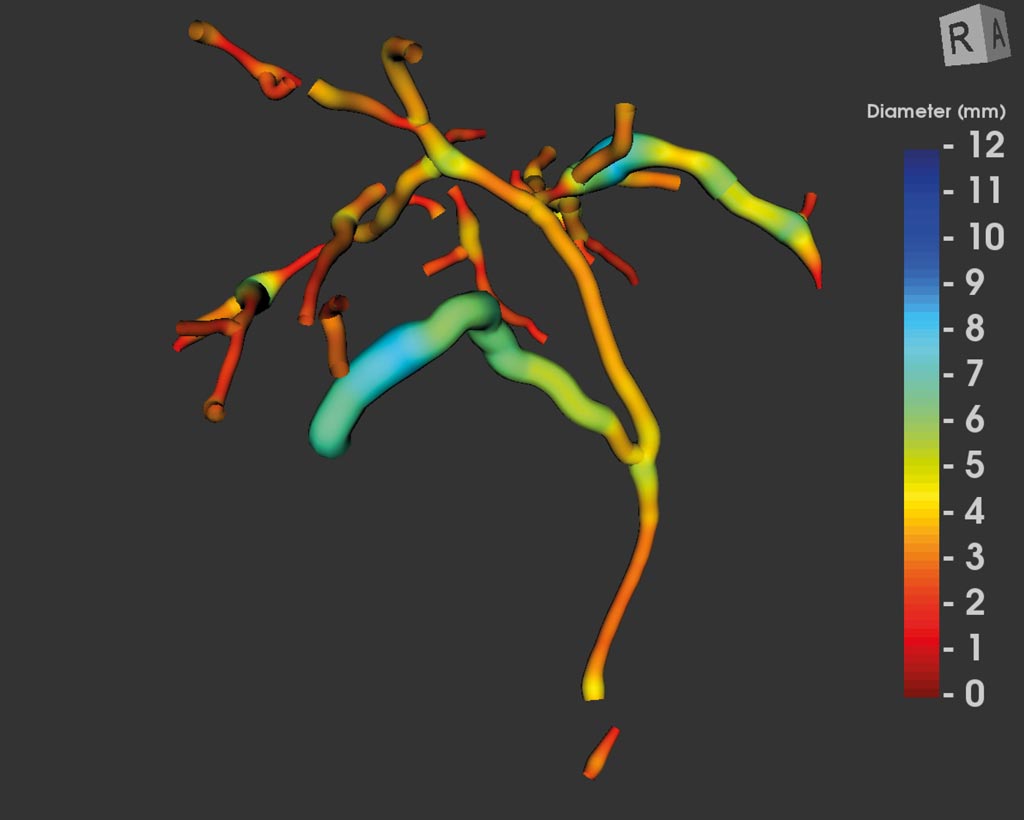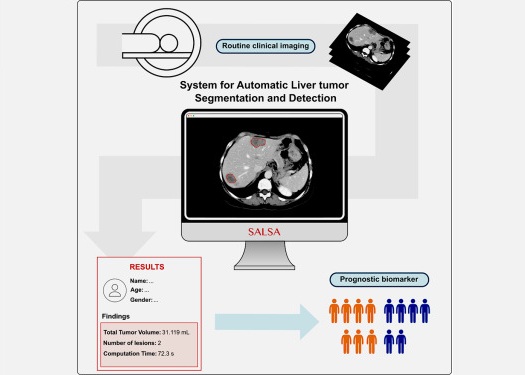MRI Diagnostic Tool Digitally Images Biliary Tree and Ducts
|
By MedImaging International staff writers Posted on 07 Feb 2019 |

Image: MRCP+ imaging of the biliary tree (Photo courtesy of Perspectum Diagnostics).
Advanced magnetic resonance cholangiopancreatography (MRCP) imaging software visualizes intra-hepatic ducts and measures bile ducts width and biliary tree and gallbladder volume.
The Perspectum Diagnostics (Oxford, United Kingdom) MRCP+ quantitative biliary imaging tool uses computational techniques to support the visualization, evaluation and reporting of hepatobiliary structures. The quantitative magnetic resonance imaging (MRI) and artificial intelligence (AI) algorithms are designed to enhance MRCP images by combining image viewing, processing, and reporting tools, which is especially relevant for serial evaluation of primary sclerosing cholangitis (PSC) patients.
MRCP+ can process data from all 1.5T and 3T MR scanners that support three-dimensional (3D) MRCP sequences, providing standardized quantitative metrics for the pancreatobiliary system. MRCP+ is also safe, non-invasive, and does not involve the use of contrast media. A typical scan takes less than 15 minutes to complete, with same-day results. Current diagnosis of PSC is hindered by lack of effective biomarkers, and interpretation of conventional MRCPs itself is both qualitative and subject to relatively low inter-operator reliability.
“Perspectum develops quantitative MRI for decision support in a range of diseases in the liver and related organs. MRCP+ is one of the first examples of AI in medical imaging being used to solve unmet needs in hepatobiliary medicine,” said Professor Sir Michael Brady, MD, founder, chairman, and image analysis lead of Perspectum Diagnostics.
“The ability to diagnose and monitor the progression of PSC is needed to help develop new treatments, improve methods for cancer surveillance and allow the early management of symptoms and complications of PSC,” said Martine Walmsley, chair of Trustees for PSC Support (Didcot, United Kingdom). “To this end we welcome the clearance of MRCP+ which will provide additional information for clinicians and researchers, helping address unmet need for patients with PSC.”
PSC is a rare long-term, progressive autoimmune disease of the liver and gallbladder characterized by inflammation and scarring of the bile ducts that drain the gallbladder, impeding the flow of bile to the intestines. Eventually, it can lead to cirrhosis of the liver and liver failure; there is no known cure. The disease was initially described in the mid-1800s but was not fully characterized until the 1970s with the advent of medical imaging techniques such as endoscopic retrograde cholangiopancreatography (ERCP).
Related Links:
Perspectum Diagnostics
The Perspectum Diagnostics (Oxford, United Kingdom) MRCP+ quantitative biliary imaging tool uses computational techniques to support the visualization, evaluation and reporting of hepatobiliary structures. The quantitative magnetic resonance imaging (MRI) and artificial intelligence (AI) algorithms are designed to enhance MRCP images by combining image viewing, processing, and reporting tools, which is especially relevant for serial evaluation of primary sclerosing cholangitis (PSC) patients.
MRCP+ can process data from all 1.5T and 3T MR scanners that support three-dimensional (3D) MRCP sequences, providing standardized quantitative metrics for the pancreatobiliary system. MRCP+ is also safe, non-invasive, and does not involve the use of contrast media. A typical scan takes less than 15 minutes to complete, with same-day results. Current diagnosis of PSC is hindered by lack of effective biomarkers, and interpretation of conventional MRCPs itself is both qualitative and subject to relatively low inter-operator reliability.
“Perspectum develops quantitative MRI for decision support in a range of diseases in the liver and related organs. MRCP+ is one of the first examples of AI in medical imaging being used to solve unmet needs in hepatobiliary medicine,” said Professor Sir Michael Brady, MD, founder, chairman, and image analysis lead of Perspectum Diagnostics.
“The ability to diagnose and monitor the progression of PSC is needed to help develop new treatments, improve methods for cancer surveillance and allow the early management of symptoms and complications of PSC,” said Martine Walmsley, chair of Trustees for PSC Support (Didcot, United Kingdom). “To this end we welcome the clearance of MRCP+ which will provide additional information for clinicians and researchers, helping address unmet need for patients with PSC.”
PSC is a rare long-term, progressive autoimmune disease of the liver and gallbladder characterized by inflammation and scarring of the bile ducts that drain the gallbladder, impeding the flow of bile to the intestines. Eventually, it can lead to cirrhosis of the liver and liver failure; there is no known cure. The disease was initially described in the mid-1800s but was not fully characterized until the 1970s with the advent of medical imaging techniques such as endoscopic retrograde cholangiopancreatography (ERCP).
Related Links:
Perspectum Diagnostics
Latest MRI News
- Cutting-Edge MRI Technology to Revolutionize Diagnosis of Common Heart Problem
- New MRI Technique Reveals True Heart Age to Prevent Attacks and Strokes
- AI Tool Predicts Relapse of Pediatric Brain Cancer from Brain MRI Scans
- AI Tool Tracks Effectiveness of Multiple Sclerosis Treatments Using Brain MRI Scans
- Ultra-Powerful MRI Scans Enable Life-Changing Surgery in Treatment-Resistant Epileptic Patients
- AI-Powered MRI Technology Improves Parkinson’s Diagnoses
- Biparametric MRI Combined with AI Enhances Detection of Clinically Significant Prostate Cancer
- First-Of-Its-Kind AI-Driven Brain Imaging Platform to Better Guide Stroke Treatment Options
- New Model Improves Comparison of MRIs Taken at Different Institutions
- Groundbreaking New Scanner Sees 'Previously Undetectable' Cancer Spread
- First-Of-Its-Kind Tool Analyzes MRI Scans to Measure Brain Aging
- AI-Enhanced MRI Images Make Cancerous Breast Tissue Glow
- AI Model Automatically Segments MRI Images
- New Research Supports Routine Brain MRI Screening in Asymptomatic Late-Stage Breast Cancer Patients
- Revolutionary Portable Device Performs Rapid MRI-Based Stroke Imaging at Patient's Bedside
- AI Predicts After-Effects of Brain Tumor Surgery from MRI Scans
Channels
Radiography
view channel
AI Improves Early Detection of Interval Breast Cancers
Interval breast cancers, which occur between routine screenings, are easier to treat when detected earlier. Early detection can reduce the need for aggressive treatments and improve the chances of better outcomes.... Read more
World's Largest Class Single Crystal Diamond Radiation Detector Opens New Possibilities for Diagnostic Imaging
Diamonds possess ideal physical properties for radiation detection, such as exceptional thermal and chemical stability along with a quick response time. Made of carbon with an atomic number of six, diamonds... Read moreUltrasound
view channel.jpeg)
AI-Powered Lung Ultrasound Outperforms Human Experts in Tuberculosis Diagnosis
Despite global declines in tuberculosis (TB) rates in previous years, the incidence of TB rose by 4.6% from 2020 to 2023. Early screening and rapid diagnosis are essential elements of the World Health... Read more
AI Identifies Heart Valve Disease from Common Imaging Test
Tricuspid regurgitation is a condition where the heart's tricuspid valve does not close completely during contraction, leading to backward blood flow, which can result in heart failure. A new artificial... Read moreNuclear Medicine
view channel
Novel Radiolabeled Antibody Improves Diagnosis and Treatment of Solid Tumors
Interleukin-13 receptor α-2 (IL13Rα2) is a cell surface receptor commonly found in solid tumors such as glioblastoma, melanoma, and breast cancer. It is minimally expressed in normal tissues, making it... Read more
Novel PET Imaging Approach Offers Never-Before-Seen View of Neuroinflammation
COX-2, an enzyme that plays a key role in brain inflammation, can be significantly upregulated by inflammatory stimuli and neuroexcitation. Researchers suggest that COX-2 density in the brain could serve... Read moreGeneral/Advanced Imaging
view channel
CT-Based Deep Learning-Driven Tool to Enhance Liver Cancer Diagnosis
Medical imaging, such as computed tomography (CT) scans, plays a crucial role in oncology, offering essential data for cancer detection, treatment planning, and monitoring of response to therapies.... Read more
AI-Powered Imaging System Improves Lung Cancer Diagnosis
Given the need to detect lung cancer at earlier stages, there is an increasing need for a definitive diagnostic pathway for patients with suspicious pulmonary nodules. However, obtaining tissue samples... Read moreImaging IT
view channel
New Google Cloud Medical Imaging Suite Makes Imaging Healthcare Data More Accessible
Medical imaging is a critical tool used to diagnose patients, and there are billions of medical images scanned globally each year. Imaging data accounts for about 90% of all healthcare data1 and, until... Read more
Global AI in Medical Diagnostics Market to Be Driven by Demand for Image Recognition in Radiology
The global artificial intelligence (AI) in medical diagnostics market is expanding with early disease detection being one of its key applications and image recognition becoming a compelling consumer proposition... Read moreIndustry News
view channel
GE HealthCare and NVIDIA Collaboration to Reimagine Diagnostic Imaging
GE HealthCare (Chicago, IL, USA) has entered into a collaboration with NVIDIA (Santa Clara, CA, USA), expanding the existing relationship between the two companies to focus on pioneering innovation in... Read more
Patient-Specific 3D-Printed Phantoms Transform CT Imaging
New research has highlighted how anatomically precise, patient-specific 3D-printed phantoms are proving to be scalable, cost-effective, and efficient tools in the development of new CT scan algorithms... Read more
Siemens and Sectra Collaborate on Enhancing Radiology Workflows
Siemens Healthineers (Forchheim, Germany) and Sectra (Linköping, Sweden) have entered into a collaboration aimed at enhancing radiologists' diagnostic capabilities and, in turn, improving patient care... Read more





















